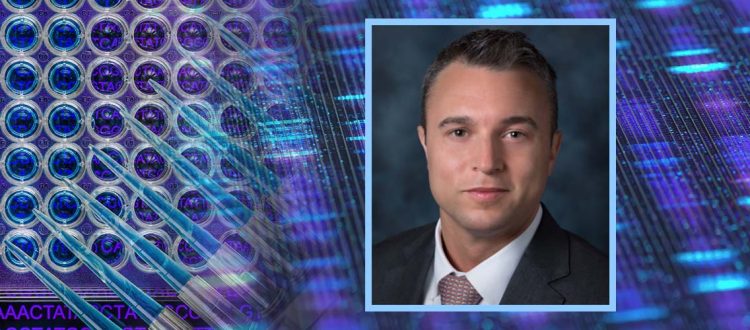Foundation Research Scholar Lauds Funding as ‘Instrumental’ to Understanding of Peritoneal Spread
As Samuel J. Klempner, M.D. approaches the completion of his three years as a Ben Feinstein Memorial Research Scholar, he’s reporting promising results from the research he was able to accomplish with the funding he received from Gastric Cancer Foundation and the American Gastroenterology Association (AGA)
Klempner, a medical oncologist at Massachusetts General Hospital, was awarded the $300,000 grant in 2020. His plan was to explore tumor and immune features of “peritoneal disease”—the migration of cancer cells into the lining of the abdomen. About 40% of gastric cancer patients experience this problem, which is associated with shorter survival and lesser benefit from immunotherapies. Klempner’s work has focused in on the composition of the abdominal fluid in gastric cancer patients with peritoneal spread, which is called the ascites (uh-SY-tees).
Over the past three years, Klempner and his colleagues have profiled more than 600,000 cells from 23 patients, including tumor and immune cells. They were able to identify several interesting subsets of cells, leading to a rich dataset. They have generated cell lines and organoids from several of the gastric cancer patients and are currently isolating several specific immune cell subsets for functional studies.
By the end of 2023, Klempner’s lab will have completed an atlas of ascites from gastroesophageal adenocarcinomas that focuses on the cell types and states that are active in ascites-derived immune cells. The researchers are now exploring the relationships between those cell types and patient outcomes, including their responses to particular drugs used to treat their cancer. Klempner believes the work he has completed over the past three years could nominate new therapeutic approaches to treating gastric cancer patients with peritoneal spread.
For example, in collaboration with another research group at Mass General, Klempner and his colleagues have been studying circulating factors in ascites that may blunt the ability of the immune system to combat peritoneal tumors. They tested about 90 circulating proteins called chemokines and cytokines, identifying several immune-suppressing cytokines that are particularly prevalent in ascites. They are currently completing preclinical studies with the aim of trying a novel combination in humans: standard chemotherapy with a drug that inhibits one of those three cytokines, IL-6. The anti-IL-6 drug could be injected directly into the peritoneal cavity.
“Gastric cancer remains a major global problem but continues to be underfunded. Mechanisms like the AGA-GCF Ben Feinstein Memorial Research Scholar Award allow us to make key steps toward understanding and improving the outcomes for our patients.”
During the three-year grant period, Klempner has co-authored several publications, including five in 2022 that described findings from research partly funded by the GCF-AGA award. They included publications in Nature, the Journal of Immunotherapy in Cancer and JCO Precision Oncology.
In his final report on the grant, Klempner reported that data generated via his Research Scholar grant has led to additional funding that will help move his research toward future clinical trials. He added that the Ben Feinstein Memorial Research Scholar Award “was instrumental in making this all happen.” Klempner went on to note that, “Gastric cancer remains a major global problem but continues to be underfunded. Mechanisms like the AGA-GCF Ben Feinstein Memorial Research Scholar Award allow us to make key steps toward understanding and improving the outcomes for our patients.”
The AGA–Gastric Cancer Foundation Ben Feinstein Memorial Research Scholar Award in Gastric Cancer provides $100,000 per year for three years to young scientists working towards careers in gastric and esophageal cancer research. Klempner was the third recipient of the award. In July 2023, Martina Molgora of Washington University School of Medicine was named the fourth Research Scholar.

